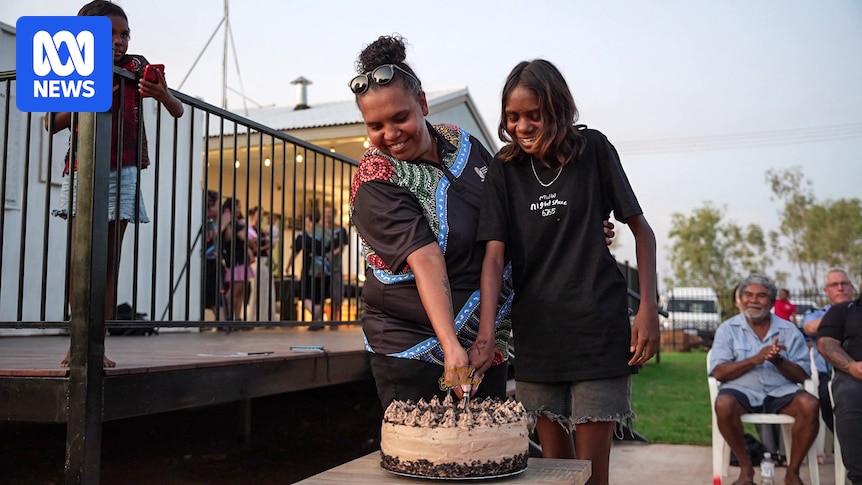As the setting sun brings a reprieve to a stifling hot day in the West Australian town of Fitzroy Crossing, children run around laughing as their families listen to speeches marking a milestone.
Standing in front of the crowd, Rochelle Dolby speaks proudly at the one-year anniversary of the community’s Night Space run by Marra Worra Worra (MWW) Aboriginal Corporation, more than 2,500 kilometres north of Perth.
“We listen to our young people’s voices and have worked with them to create a space [they told us] they needed,” she says.
“We have built healthy relationships, shared stories, laughed hard, felt shame, had dinner together and we got to know more about our language, family and culture.”
Children line up for a buffet to celebrate the one-year anniversary of the Night Space. (ABC Kimberley: Dunja Karagic)
More than 600 children have walked through the doors, accessing a safe space where they can play basketball or Uno, and get a meal after dark — with community members hailing its impact in reducing youth crime.
Meanwhile, 1,000km away, Kununurra is grappling with a surge in juvenile offending, with about 30 children recently arrested after a spate of alleged stolen vehicle and reckless driving incidents.
The arrests have led to calls from East Kimberley community leaders and politicians for initiatives like Fitzroy Crossing’s Night Space to be replicated in other towns, with one planned to open in Kununurra next year.
“Every child deserves to have something like this, a place they can go and hang out and be safe with their friends,” Ms Dolby says.
For 13-year-old Joecia, the Night Space is somewhere she enjoys visiting.
“I like to play basketball and Uno here,” she says.
Joecia, 13, says she likes coming to the Night Space to play basketball and Uno with friends. (ABC Kimberley: Dunja Karagic)
‘Significant’ reduction in youth crime
Night Space cook Sohraya Middleton has helped serve more than 20,000 meals to children.
She says the program keeps children off the streets and has “broken the cycle” of youth crime.
Sohraya Middleton says the program has broken the cycle of youth crime in Fitzroy Crossing. (ABC Kimberley: Dunja Karagic)
“Back in the days when we were young, we didn’t have anything [like this] … kids then used to do break-ins,” Ms Middleton says.
“Now there’s the Night Space, it decreases crime in Fitzroy, the robbing around the town … we’re just so proud.”
While giving a speech at the anniversary, Fitzroy Crossing police officer in charge Mark Howe speaks proudly about how the initiative has led to a drop in offending.
“As a police officer, we often see the darker side of life, which is why being even a small part of something as good as the Night Space — it’s good for the soul,” Senior Sergeant Howe says.
“Since its inception we’ve seen a significant reduction in stolen motor vehicles and burglaries compared to the year before its existence.”
Children visited the Night Space to celebrate the one-year anniversary. (ABC Kimberley: Dunja Karagic)
WA Police were unable to confirm how many offences were committed by children, but police data shows in the year before the Night Space’s inception there were 68 motor vehicles stolen in Fitzroy Crossing.
In the year it has been in operation, that number had more than halved.
A community-led model
The Night Space is not first attempt to create positive change in the Kimberley, but staff say it has worked because it is community led.
Ms Dolby, who is Marra Worra Worra’s youth connection programs manager, says a key reason for success is the Aboriginal organisation working with the five language groups in the Fitzroy Valley.
Rochelle Dolby says the Night Space has had a positive impact on the community. (ABC Kimberley: Dunja Karagic)
“There’s a lot of drive from elders, community members, they know what they want to see for their kids,” she says.
Night Space youth connection officer Lionel Marr, who grew up in Fitzroy Crossing, says having local staff is critical in building connections with the children.
“Not being judgemental or anything, opening the front gates and letting them come in and feel safe,” he says.
“[They] open up to some of our staff with what’s going on around town or at home, just building that relationship with them.”
Marra Worra Worra director Patrick Green echoed the sentiment.
Patrick Green says the Night Place offers children a safe space to visit. (ABC Kimberley: Dunja Karagic)
“The success comes from everybody wanting to participate in making a difference for our children,” he says.
“It makes me proud to be part of an organisation that’s creating something, that can be replicated elsewhere, but to replicate something like this needs a whole-of-community approach.”
A role model for other towns
Speaking about youth crime in Kununurra last month, Premier Roger Cook labelled it a “complex policy area”, but said he wanted to replicate programs such as Fitzroy Crossing’s Night Space.
Last month, former WA attorney-general John Quigley travelled across the Kimberley with WA Children’s Court president Hylton Quail and Chief Justice Peter Quinlan.
John Quigley says Fitzroy Crossing is leading the way in the Kimberley. (ABC Kimberley: Dunja Karagic)
“[There’s a] 25 per cent reduction in Fitzroy, whilst up the highway there’s a 24 per cent rise in Halls Creek, a significant rise in Kununurra,” he says.
“Fitzroy Crossing community is showing the way.”
Mr Quigley hopes more attention is given to strategies like the Night Space.
“You cannot arrest your way out of a social problem, it’s up to the community to wrap their arms around those in need,” he says.
“What is the alternative?
“It costs $850 a day to put someone in Banksia Hill [Detention Centre] with all the support services around them, it costs thousands of dollars to take someone down from here, it’s just money wasted.
“Put the money in here, you can see the results and we’re demonstrating the results to the government.”

